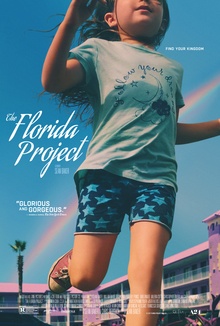Moonee is a girl who lives in the shadow of Florida’s Disney World, a stretch dominated by second-class thrills and amusements. Their room in the motel is a luridly painted stucco-clad palace that either aims to highlight false advertising with true aspirations or savage irony. Strip clubs and strip malls, knockoff souvenir shops, and ice cream shacks are literally everywhere near her home. Kids out of school and on the loose, their inability to access the mammoth Disney complex nearby and their acceptance of it make the film an absolute must-watch. For Moonee, her neighborhood is a haven of endless mischief, enchantment, and adventure. Her mother, Halley (Bria Vinaite), is oblivious to the degree of freedom and dangers her daughter is exposed out there. Moonee and her two friends, Scooty (Christopher Rivera) and Jancey (Valeria Cotto) are always vivacious, cooking up pranks and conning Disney visitors, all for fun. However, while watching the film, you won’t escape the fact that her risk-free nature might culminate to be something terrible later.
The welfare American life
But throughout Moonee’s travails, The Florida Project manages to delve away from being cruel and exploitative, endlessly subjecting viewers to the thrilling fun. Perhaps this is the best form of acting ever staged for years as its humor is unforced and sometimes miraculously natural. The kids’ lines don’t look over-rehearsed and instead appear as if everything they say and do is real and unscripted. It is just another type of excellent performance! The Florida Project is set in a cheap motel in Kissimmee, Florida and perfectly brings out the kind of life in welfare places for mortgage defaulters and transients. By using a polished look and bright colors of the summer, much of the movie’s themes become vivid and easier to understand. The drama brings out the paradox of not being of Disney’s magic kingdom, though there’s a lot of adventure in it. Halley is part of her family that upholds the family’s tradition of raising kids in the budget motel. And throughout her pursuit of money, steady job and having a stable home, it is the same consumer economy that limits her from achieving all of them. It is the reason why The Florida Project tries to be candid about the limits of benevolence and wishful thinking. The sharp twists of the film’s final scenes are marvelously ambiguous and devastating and may leave you furious and unhappy. But it rightly shines a ray of truth and casts a spell on the significance of the movie. The Florida Project has featured on, among other review sites, The New York Times as one of the best drama films of 2017 and The Guardian as how the world appears in the eyes of a child. To watch The Florida Project, click here
